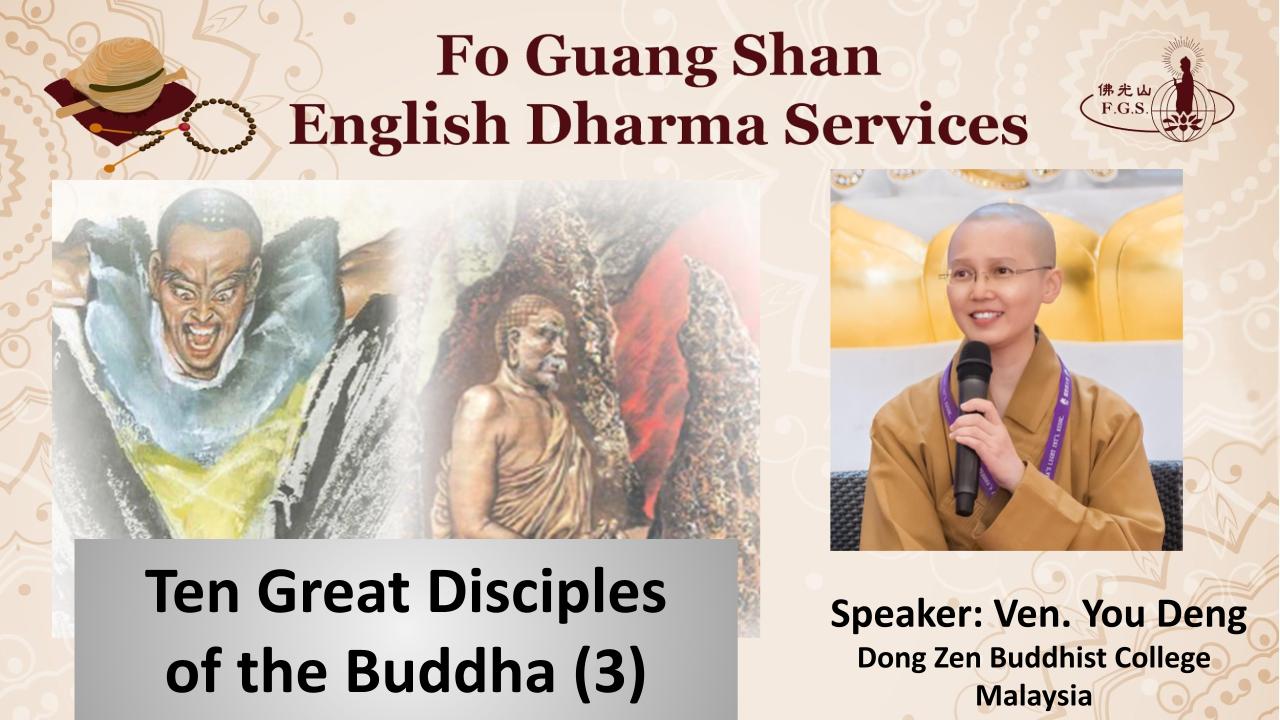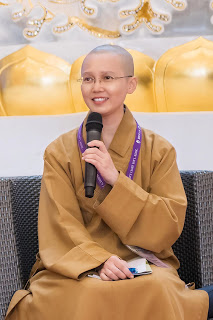
Speaker: Ven. You Deng
Fo Guang Shan Dong Zen Buddhist College, Malaysia
I. Introduction
Auspicious Greetings to all Dharma friends!
This is You Deng from Dong Zen Buddhist College in Malaysia.
Nice to meet you all again.
This time, I would like to share the story of The Ten Great Disciples of Buddha. Each of them has own expertise and achievements. They have an indelible credit for propagating the Buddha’s teachings. To this day, they are the same as the Buddha that will be admired by future generations.
II. Mahākātyāyana, Foremost in doctrinal exposition
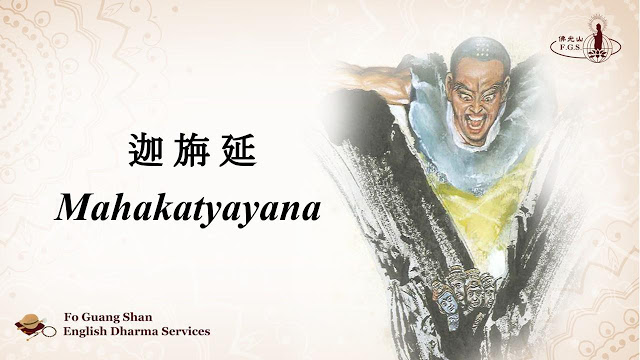
Mahākātyāyana was born into the Brahmin caste in the kingdom of Avanti in western India. His father was the national teacher of the king and the family was well respected by the people at that time.
Mahākātyāyana was smart. He studied the Vedas under his uncle Asita, who had made a prediction that Prince Siddhārtha would attain Buddhahood.
A Mysterious Stone Tablet
Mahakatyayana understood many languages too.
Once, there was an ancient stone tablet in the city of Vārānasī. People commented that the inscriptions on it were unrecognizable, only an Enlightened One could understand it. Therefore, The king announced those who were able to read the inscriptions would be highly rewarded.
Upon hearing the news, Mahakatyayana went to the palace and met the king. He told the King with confidence, and said “I can translate it!”
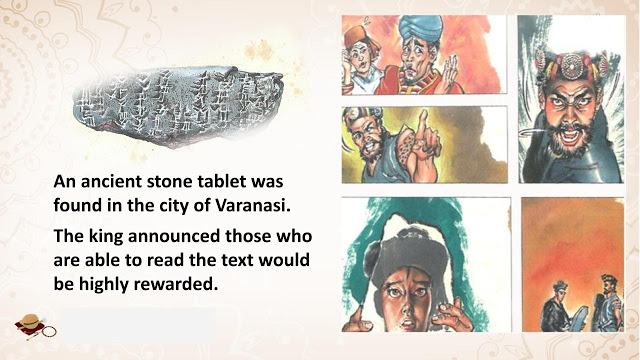
Indeed, Mahakatyayana was able to translate and read the inscriptions on the stone tablet, but he doesn’t understand the meaning. Due to his ego, he promised the king he would find out the meaning within 7 days.
Mahakatyayana remembered his uncle Asita once said “Buddha is the enlightened one.” Hence, he went to meet Buddha hoping that the Buddha would be able to reveal the meaning of the inscriptions.
My lord Buddha, would you please enlighten me?
Buddha,
- Who is the king of kings?
- Who is the Holy One?
- Who is the fool ?
- Who is the wise?
- How to get rid of Dirt?
- How to achieve Nirvana?
- Who is in the sea of life and death?
- Who is free from suffering?
Buddha replied :
- The king of the kings is the sixth king. (Maheśvara)
- The most Holy One is the Buddha.
- A fool is one who is ignorance.
- A wise man achieves freedom of liberation.
- A spiritual practitioner eliminated from the afflictions of greed, anger and ignorance is free from dirt.
- Practice Precept, Meditative Concentration, and Wisdom are ways to achieve Nirvana.
- A self-attached person lives in the sea of life and death.
- A person who understands the law of dependent origination liberates from suffering.
Mahakatyayana was enlightened after hearing Buddha’s answers. He ordained under Buddha and attained arhatship
Mahakatyayana was famous for his ability to convince Brahmin to accept the teaching of Buddha and many had converted into Buddhist. There were many stories that showed how Mahakatyayana debated with Brahmins.
To promote equality
Once Mahakatyayana brought his 3 robes and a bowl went to Mathura, preaching Dharma to the King.
The king asked him, “You are the noblest Brahmin, but Buddha is Ksatriya. Now you became Buddha’s disciple, don’t you feel humiliated?
Mahakatyayana replied, “King, I am proud to be Buddha’s disciple.”
Mahakatyayana continued, “In terms of occupation, there are differences in the division of labor between religion, politics, business, industry and agriculture, to form classes. But it is wrong to classify each class good or evil. Among the Brahmin caste, there are killing, sexual misconduct, wrongdoing, creating a variety of evil people, are these noble people? My king, a person who is able to awaken is noble, regardless of caste.
The king finally awakened after listening to Mahakatyayana’s explanation. He accepted Buddha teaching of equality and also took refuge under the Buddha. The king released the innocent Shudras in the prison, revised the policies, abolished the inequality ruling and promoted caste equality.
The people of the country were happy and grateful for the Dharma of compassion and equality.
Challenges from Brahmins
Many Brahmin were unhappy with Mahakatyayana. Because they felt he betrayed the Brahmin caste. Hence, there were many Brahmin who found opportunities to challenge him.
One day, Mahakatyayana was having a meal with a group of bhiksu, an elder Brahmin stood beside him, hoping Mahakatyayana would give his seat to him. Unfortunately, Mahakatyayana ignored him. The elder was furious and shouted why no one gave a seat to him.
When everyone stand up to give the seat to the Brahamin elder, Mahakatyayana remain seated and said, “ Who are you ? Everyone uphold the teaching. There is no elder or senior here. From your rude behavior and the tone of your speech, you don’t deserve to be called an elder, nor do you deserve respect.”
Mahakatyayana said mildly, “If a Brahmin is unable to remove Greed, Hatred and Ignorance, he is not a spiritual practitioner even at the age of eighty or ninety. On the contrary, if there is a twenty-year-old youth, he is free from the shackles of love, no greed, no unequal ideas, although he is young, but can be regarded as elder and should be respected.” The Brahmin elder walked away in silence after hearing Mahakatyayana words.
Yet another time, as Mahakatyayana was walking along the street on his alms round, a brahmin approached him.
The brahmin asked, “Honorable Mahakatyayana, I have seen ksatriyas fight ksatriyas and brahmins fight brahmins. What causes them to fight?”
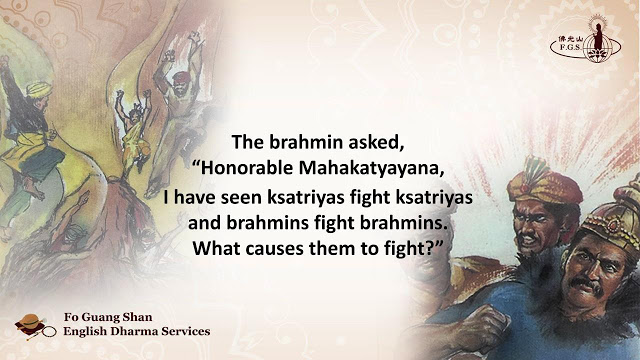
“The delusion of greed.” replied Mahakatyayana.
The brahmin asked again, what causes you bhiksus to fight with one another?”
“Attachment to self.” The brahmin was satisfied with Mahakatyayana’s answer. However, he asked yet another question, “What kind of person is able to cut off greed and self?”
Without a moment’s hesitation, Mahakatyayana replied, “My teacher, the Buddha. He does not suffer from greed and is without self-attachment. He is truly the teacher of human and heavenly beings.”
The brahmin sought refuge in Buddha, becoming a lay devotee.
Overcoming Death and Grief
One day, the Queen of King Mandha passed away. The king was saddened over the death of The Queen. He refused to eat. He even instructed his attendant to dip the remains of The Queen into sesame oil for preservation so that her remains would not rot.
The attendant was worried about the condition of the King so he suggested that he meet Mahakatyayana. The king went to see Mahakatyayana hoping he can bring his Queen alive.
When Mahatyayana met the King, he broke a branch of the tree and he said, “My King, bring this branch of tree to the palace and ensure it will grow forever.”
The king replied, “Is impossible as the branch is broken.”
Mahatyayana said, “Then, the Queen has died, how can she be resurrected?”
The words of Mahakatyayana made the King understand the truth of impermanence.
Mahatyayana further said, “My king, you should extend your love for the Queen, to the people of the whole country. By doing so, the country will prosper and the people will be loyal and respect you.”
The King was enlightened and buried the Queen. He also turned grief into strength. He loves the people just like he loved the Queen. The people of the country were happy and expressed their appreciation toward Makatyaynana.
Selling and Buying Poverty
One day, Mahakatyayana saw an old woman holding a water jug crying along the river. Out of compassion, Mahakatyayana asked the old woman why she cried.
Old woman replied, “You cannot help me. There is inequality in the world. I am a poor person, and have been tortured and suffered for life because of poverty. You are a monk, you are free from suffering. We are slaves of wealthy families, we don’t have freedom. We don’t have enough clothing and food. Our master is wicked, he scolds and beats us even if we made a small mistake.”
Mahakatyayana said, “ Don’t be sad, let me tell you the way to free yourself from poverty and become rich. You are so poor, why don’t you sell your poverty?”
“How do I sell it? Who wants to buy my poverty?” The old woman asked
Mahakatyayana told her, “You need to practice giving and generosity. There are reasons being poor or rich. A person is poor in this life because he was stingy in previous life. Some are rich because they cultivate merit and generosity in past life. So the way to sell away poverty is to practice giving and cultivate merit.”
Old woman said, “You’re right. I now understand how to become rich. But I am extremely poor and have no possessions. Even the water jug that I hold belongs to my master. How can I practice generosity?”
Mahakatyayana handed his alms bowl to the old woman and said, “Take this bowl, pour some pure water into it and offer it to me.”
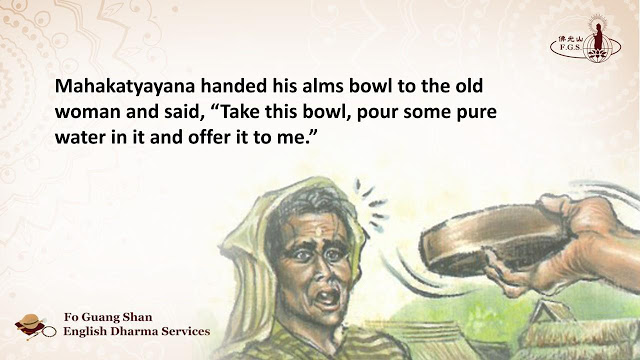
The woman did as she was told and became overjoyed. Later, she was reborn in Trayastrimsa Heaven to enjoy pleasures there.
Mahakatyayana’s skill in doctrinal exposition brought many people to take refuge in the Triple Gem.
III. Mahākāśyapa, foremost in ascetic practices
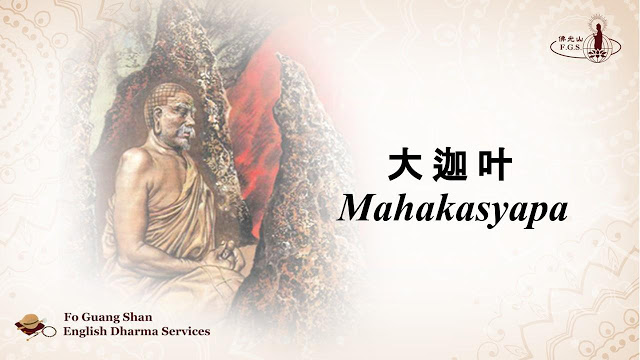
Mahakasyapa was born in a rich Brahmin family, in a village of Magadha Kingdom
Like Buddha, Mahakasyapa was also born under the tree. Mahakasyapa received every care and love from his parents. At the age of 8, he learned painting, arithmetic, literature, music and so on. He had no desire for material comfort and pleasures, and he preferred to be alone.
A Pair of Unwilling Couple
When Mahakasyapa grew into a handsome young man, his parents wanted him to get married. Mahakasyapa expressed his wish to practise a religious life. His parents were against the idea. In order to stop his parents from forcing him to get married. Mahakasyapa hired a famous sculptor to sculpt a statue of a beautiful lady out of gold. He then took the statue to his parents and said, “If you want me to get married, you must find a lady as pretty as this statue to be my wife.“
His parents were troubled by his request and finally they followed the advice of a Brahmin. The Brahmin suggested placing the golden statue under a big umbrella and sent it to every corner of Magadha. Whenever the statue was brought to a place, the Brahmin would tell the crowd, “Ladies, give offerings to this goddess and your wish will come true.”
In a city called Vaishali, there lived a rich Brahmin who had a pretty daughter named Subhadra. Subhadra was so pretty that the golden goddess was overshadowed by her. The Brahmin was very delighted. He then paid a visit to her family and her parents gladly approved of the marriage.
Everything was arranged and Subhadra was brought to the family of Mahakasyapa. On the wedding night, both the bridegroom and the bride looked worried and sat aside. Finally Mahakasyapa broke the silence and asked Subhadra what troubled her. Subhadra replied, “I have no desire for the five passions and I would like to practice a religious life. But my father was tempted by the wealth of your family and agreed to this marriage. Now my hope of practicing a religious life was dashed off.” Mahakasyapa was glad to know this and both agreed to sleep on separate beds.
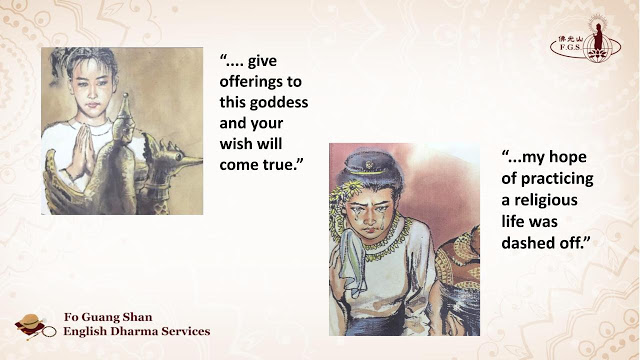
Twelve years later, Mahakasyapa’s parents had passed away. He decided to renounce the world. Mahakasyapa asked Subhadra to wait for him at home and promised that once he found a good teacher, he would return and let her practice religious life together.
It was said that the day Mahakasyapa renounced the world coincided with the day that the Lord Buddha attained perfect enlightenment.
Looking for a Teacher
Mahakasyapa looked for a religious teacher everywhere, but none could satisfy him. Two years later, he was told that Sakyamuni Buddha was the Great Enlightened One who was dwelling in Venuvana (Bamboo-grove) with His thousand disciples.
Hence, Mahakasyapa followed the devotees to Venuvana to listen to the Buddha’s teaching, and he was deeply moved by the virtues and wisdom of Buddha.
One day, on his way home, he saw the Buddha sitting under a tree, as stately as a golden mountain. He was surprised to see the Buddha there as he remembered that the Buddha was still in Venuvana before he left there. He prostrated himself before the Buddha and said, “Lord Buddha, my great teacher, please take me as your disciple.”
The Buddha said, “Mahakasyapa, no one in this world is qualified to be your teacher unless he had attained perfect enlightenment. I have heard about you for a long time and I know you will come to see me one day. You will be a great help to the propagation of Buddhism. Do come with me.”
Mahakasyapa attained enlightenment seven days after he was ordained as a monk under the buddha.
Two years later, his wife Subhadra also renounced and joined the Order of Bhikkhuni. However, her beauty became the topic of gossipers. So, she isolated herself from the masses and stopped alms round.
Mahakasyapa felt pity for her and with the approval of the Buddha, he shared the food with her. This however became the topic of gossipers again. Some even accused them of having an intimate relationship. Mahakasyapa did not take all this gossip to heart, but in order to encourage Subhadra to cultivate the path, he left her alone.
Subhadra devoted every effort to cultivate the path and she finally attained enlightenment.
A Life of Austerity
Mahakasyapa was a strict observer of the austerity practices.
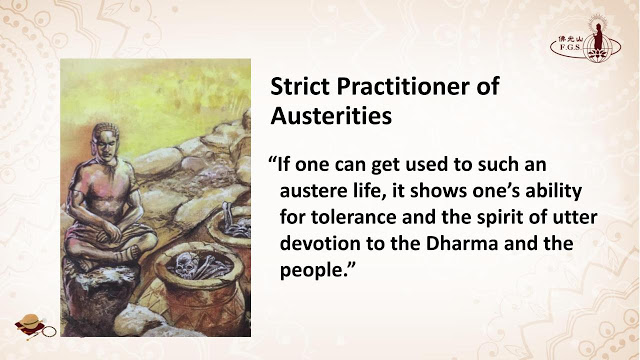
He did not join Sariputra and Maudgalyayana propagating Dharma in many places. He lived as an ascetic monk even in his old age.
Once Buddha held an assembly in the hall and offered half of his seat to Mahakasyapa. Mahakasyapa prostrated himself before the Buddha and said, “Lord Buddha, I am not your chief disciple and hence I am not qualified to sit with you.”
The Buddha then described to the Order the boundless virtue of Mahakasyapa and added that even without his help, Mahakasyapa could still seek his own enlightenment and attain the stage of pratyekabuddha.
The Buddha advised Mahakasyapa to stop the austerities practice, but Mahakasyapa said, “Lord Buddha, I need to continue in these practices, as I am not as capable as Sariputra, Maudgalyayana and Purna in propagating dharma. But I will not forget the kindness of the Buddha, so I repay the kindness of the Buddha in this way.”
Mahakasyapa continued, “One who is propagating the Dharma must set a good example to people, and virtue can be cultivated through the austere life. If one can get used to such an austere life, it shows one’s ability for tolerance and the spirit of utter devotion to the Dharma and the sentient beings.
“My practice of austerities will exert a subtle influence on people’s thinking and will indirectly help them. Lord Buddha, for the consolidation of the sangha Order and the liberation of all sentient beings, I cannot give up the practice. Please forgive my obstinacy.”
After hearing that, the Buddha was pleased. He said to the Bhikkhus, “What Mahakasyapa has said is correct. To propagate the Dharma we must consolidate the sangha order. To consolidate the sangha order, we must follow strict practices. Mahakasyapa, you may do as you wish.”
Giving With Nothing
One time, Mahakasyapa encountered a poor woman. She was so poverty-stricken that she lacked food and clothing. Mahakasyapa took pity on her and approached her for alms. “I see the poverty that you live in and I’m filled with sympathy at the sight. I am a disciple of Buddha and a field of merit. Offer me what food you can and plant seeds into the field of merit, so that you can avoid such poverty in the future.”
The poor woman replied, “Your request causes me great difficulty. I am not afraid to speak to you honestly, I have not had a single grain of food to eat in three days. All I have now is a little watery gruel that is beginning to smell. How can this be a fitting offering for you?”
Mahakasyapa replied, “Give me a little of your gruel. I am bhiksu Mahakasyapa, who has renounced to beg for alms, not from the wealthy, but from the poor. I will happily receive your offering.”
Upon hearing that, the old woman was overjoyed and immediately offered the gruel. Mahakasyapa stood before the women and drank all the gruel in a single gulp.
When this woman reached the end of her days, her merit allowed her to be reborn in the heavens and enjoy the pleasures there.
Mahakasyapa Leading the Sangha
When Buddha entered Parinirvana in the city of Kusinagara, Mahakasyapa was still in the northern country. He immediately returned to Kusinagara when he received the news.
Ninety days after the Buddha entered Parinirvana, Mahakasyapa assumed the leadership of the Sangha.
The First Council headed by Mahakasyapa, Ananda, Aniruddha, Upali and Purna was formed and was presided over by Mahakasyapa.
After the First Council, Mahakasyapa realized that he had fulfilled his mission and decided to attain final Nirvana. He climbed to the summit of Mount Kukkaṭapāda, sat down, cross-legged in a cave, and made the determination that his body should remain intact until the coming of the future Buddha, Maitreya and handing over Sakyamuni Buddha’s robe to Him.
IV. Conclusion
Dear friends, Mahakatyayana and Mahakasyapa were born in Brahmin family, they were regarded as the authorities and elders. Also, their families were well respected by the people at that time.
However, after they became Buddha’s disciples, they regarded Buddha like their father for the rest of their life.
Therefore, those who do not have confidence in the Buddha can calmly follow the footsteps of these sages and cultivate diligently.
Once again, thank you for joining us. If you find this dharma service is helpful to your practice, please subscribe to the Fo Guang Shan English Dharma Services Youtube channel and share it to your friends.
Last but not least, I wish you all stay safe, stay healthy and stay awesome. See you next week. Omitofo.

